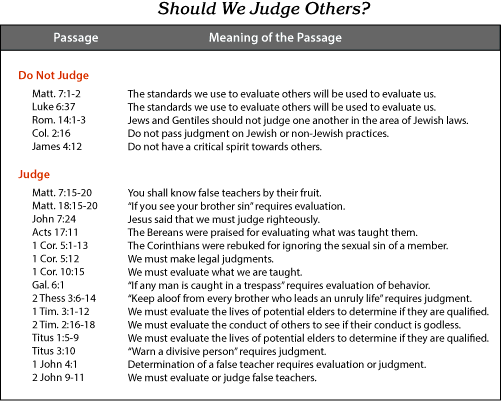Do not judge, or you too will be judged. These are familiar words to many people – words that were spoken by our Lord Jesus during the Sermon on the Mount. Recently, a well known radio speaker made the comment that John 3:16 is no longer the most often quoted verse in the Bible. It has been replaced by Matthew 7:1. I do not know if the statement is really true, but there are many Christians who really know Matthew 7:1! Tolerance is one word that characterizes our culture today. Tolerance of religion (except for Christianity), different lifestyles, opinions, and peoples, to name a few. I have had good Christians say they cannot judge me! They cannot evaluate me as a Christian! Do not judge! Is this what Jesus meant when He said,
Do not judge, or you too will be judged. For in the same way as you judge others, you will be judged, and with the measure you use, it will be measured to you. Matthew 7:1-2 (NIV)
To Judge
Does this verse mean do not evaluate others and draw conclusions about them? Does it mean people can do whatever they want to do because it is between them and the Lord? Are we only accountable to the Lord and to no one else? Today there are many who believe this is the meaning of this verse. It sounds like a loving attitude towards others. But Christians are increasingly following the attitude of the culture.
Recently a voice has been heard in America. The statement is being made that Christians are a threat to society because they are intolerant of others. Christians are accused of being intolerant of homosexuals, adultery, abortion, and the beliefs of others. Some view Christians as a threat to society.
Unfortunately, some Christians have accepted this world view and are becoming more and more tolerant of sin too! There are Christian movements today that are encouraging us not to evaluate the beliefs of “other Christians” and to emphasize love. They say, “Downplay doctrine.” But this is not what Jesus is talking about. Unfortunately, the church is increasingly looking like the world. We are adopting the culture’s world view. Christians are compromising the truth of the Word on this and other fronts.

Do Not Judge Others
What does it mean to not judge others? In order to determine what Jesus means, we will look at other New Testament passages and then at the rest of this passage.
Since God wrote the entire Bible, we can look at the rest of the New Testament to understand God’s complete thinking on the issue. There are passages that tell us not to judge others and there are passages that encourage us to judge others. I prefer the word evaluate. One of the most interesting passages about not judging others comes directly from Jesus Himself. It is found in John 7:24. Listen to Jesus.
Do not judge according to appearance, but judge with righteous judgment. John 7:24 (NIV)
Jesus says, “Do not judge” and then tells us how to judge – “with righteous judgment.” What is righteous judgment? The answer is given in Psalms.
And He will judge the world in righteousness; He will execute judgment for the peoples with equity. Psalm 9:8 (NASB)
Psalms 9:8 says that righteous judgment is objective, balanced, fair judgment – equity! It is not biased and does not distort the truth. Then later in John 7:51, Nicodemus gives the guidelines for evaluating others according to the Old Testament Law.
Does our law condemn a man without first hearing him to find out what he is doing? John 7:51 (NIV)
An individual must have the right to defend himself so that we can understand what he or she was doing. Jesus is talking about legal judgment. Notice that Jesus did not prohibit judgment.

You Must Judge Others
Most of the scripture passages dealing with judging tell us to “judge” or “evaluate others.” We are commanded to evaluate false teachers. Otherwise, you would not know they are false teachers. Today, many Christians are willing to believe a person who has a charismatic personality, is funny, or is eloquent. But this is not the criteria for truth. To determine if someone is a false teacher, we must evaluate what he or she is saying (Matthew 7:15-20; 2 John 9-11). We are also told to seriously evaluate the life style of our spiritual leaders (1 Timothy 3:1-12; Titus 1:5-9). We are encouraged to reject an argumentative person (Titus 3:10) and a lazy person (2 Thessalonians 3:6-13). We are commanded to help other Christians who are sinning to stop sinning (Matthew 18:15-20; Galatians 6:1; 2 Timothy 2:16-18). We are required to evaluate one another objectively, fairly and with balance.
Matthew 7:1 is not about not evaluating others, but is about unjust criticism. The root Greek word that Jesus used for “judge” is KRINO. It is a simple word meaning “to divide out, to sift, resolve, to determine, and to judge.” Our modern day word “critic” gives the right idea. It has the idea of an unfair evaluation. The word Jesus uses is simple in its meaning. There are no surprises.
Jesus’ Illustrations
Jesus’ illustrations actually explain what He is trying to say. His first one is,
Why do you look at the speck of sawdust in your brother’s eye and pay no attention to the plank in your own eye? How can you say to your brother, ‘Let me take the speck out of your eye,’ when all the time there is a plank in your own eye? You hypocrite, first take the plank out of your own eye, and then you will see clearly to remove the speck from your brother’s eye. Matthew 7:3-5 (NIV)
This illustration requires us to “evaluate” another person. How else can we determine that one has a speck in his eye? But Jesus warns us to be careful when we evaluate false teachers, church leaders, lazy people, argumentative individuals and sinning Christians. Before we evaluate another person, we need to check ourselves out first. He may only have a speck in his eye while you have a beam of wood in your eye. Jesus did not warn us to not evaluate others. He called us to evaluate others with equity.
Jesus’ second illustration really makes His point very clear,
Do not give dogs what is sacred; do not throw your pearls to pigs. If you do, they may trample them under their feet, and then turn and tear you to pieces. Matthew 7:6 (NIV)
We need to ask ourselves this question, “How can we determine that someone is a “dog” without evaluating others? Jesus is not saying “Stop evaluating others!”
In those times, the Jews regarded dogs and swine as unclean or unholy. So He is referring to those who reject and trample on God’s Word and our righteous acts. Two great examples of this are found in Acts 13:45-46 and Acts 18:6. In both situations, Paul was telling some Jews about Jesus. They not only rejected the message of truth; they started blaspheming and contradicting and resisting the message! They were trampling the message of truth – a holy pearl which is of great value! A secondary meaning to this illustration can be found in 2 John 10 where we are commanded not to receive a false teacher into our home nor to give him a greeting.
Conclusion
For non-Christians, the message of both Matthew 7:2 and Romans 2:1-16 is serious. When Jesus says the “measure we use to evaluate others is the measure He will use against us,” He means that God will some day use the unbeliever’s standard for evaluating others to evaluate them – to send them to hell!
As a Christian, I thank Jesus that my sins are forgiven. I thank Him that the unkind criteria, the insulting thoughts, the uninformed opinions, that impatient standard that I have used against others will never be used against me. Thank you Jesus for forgiving me in spite of myself! I sure do not deserve it . . .